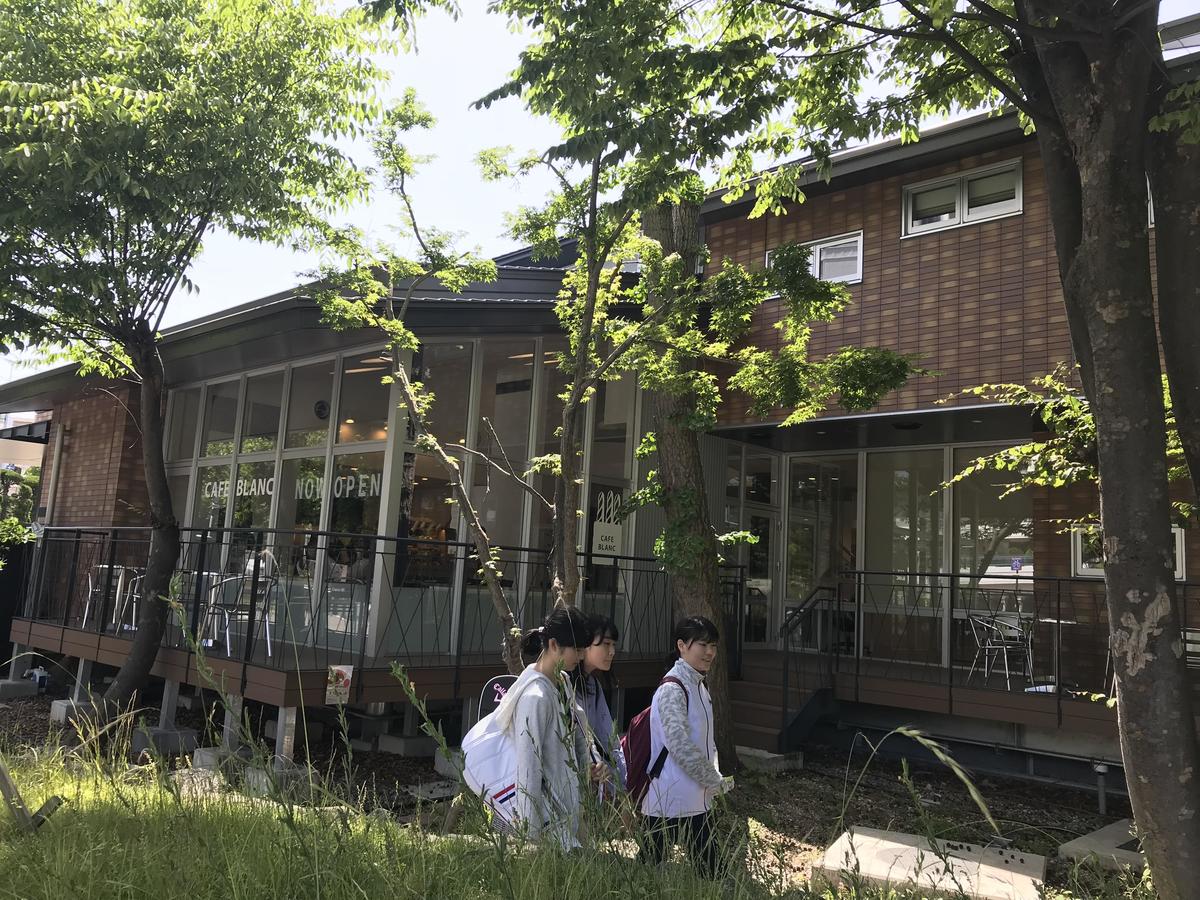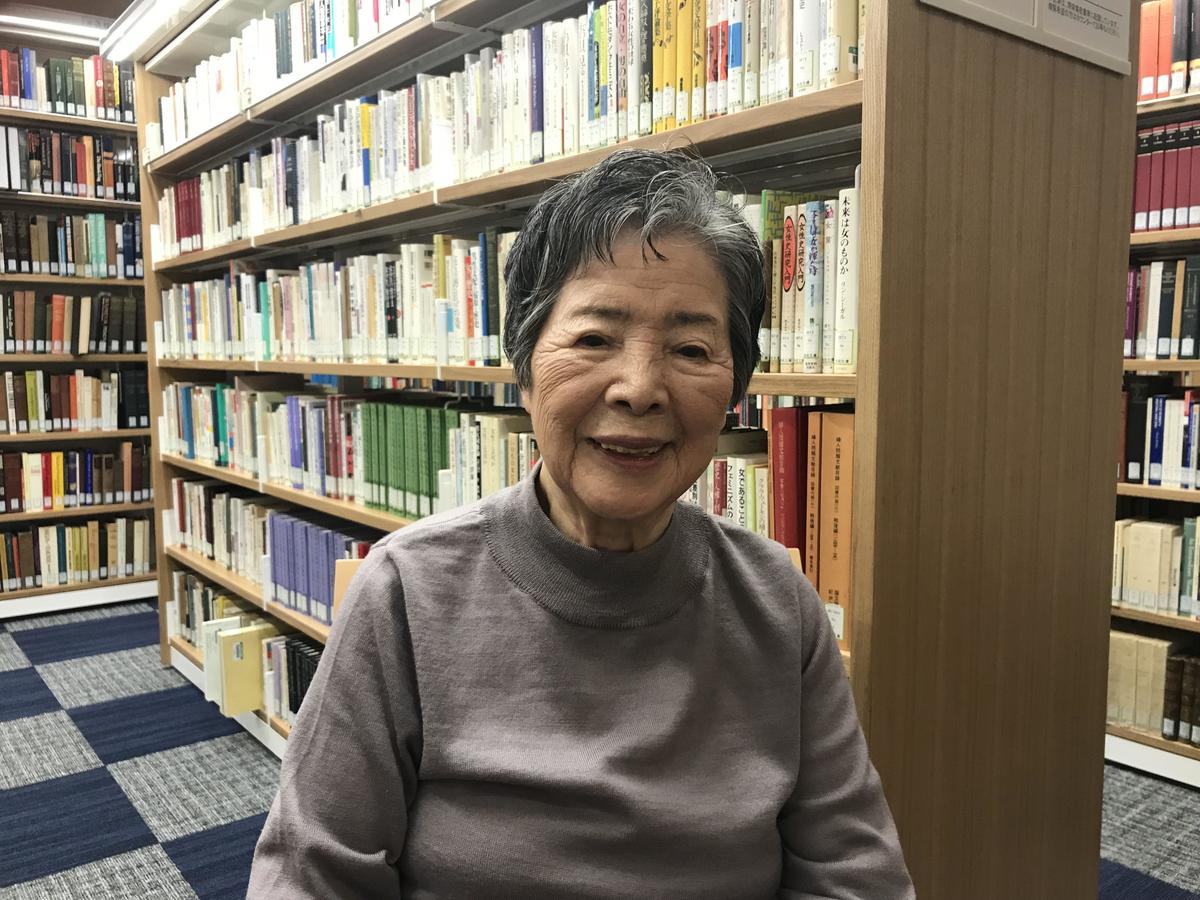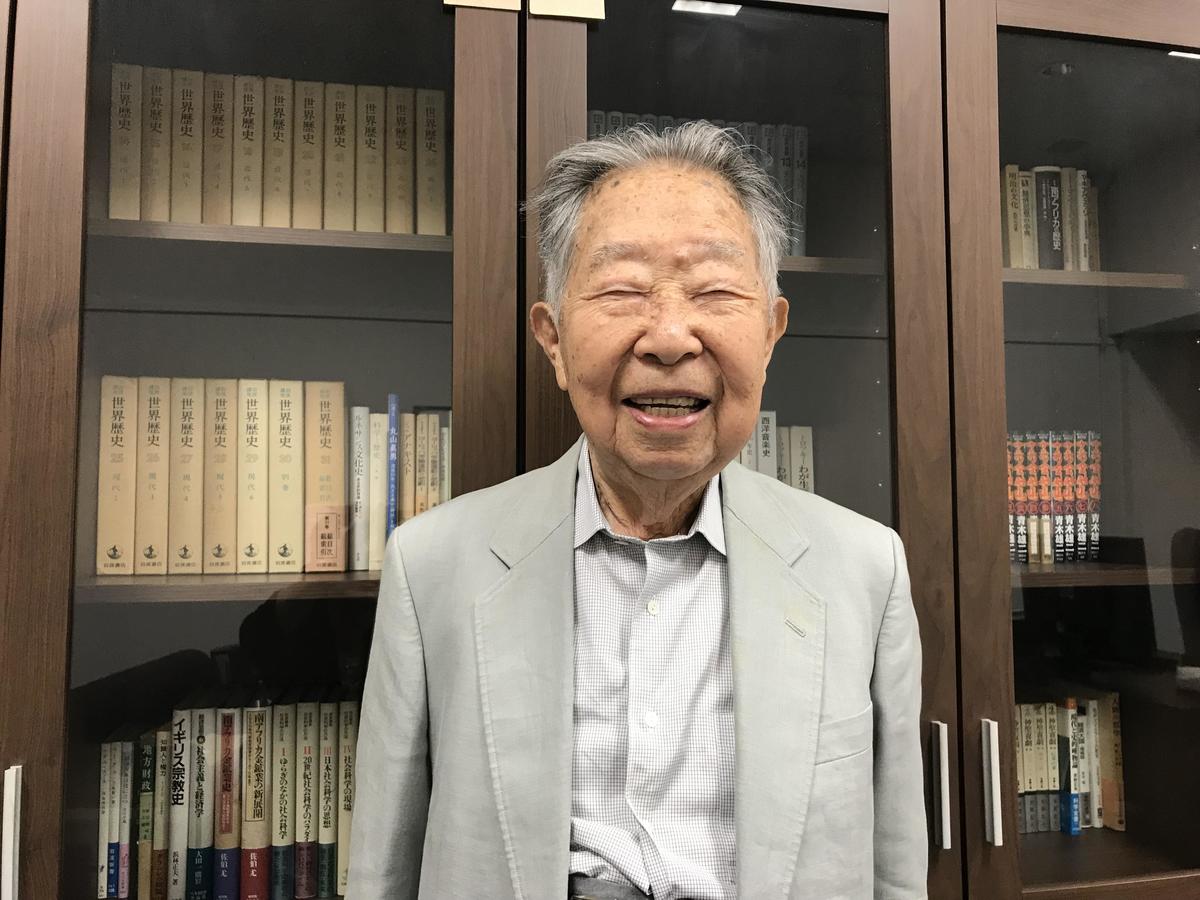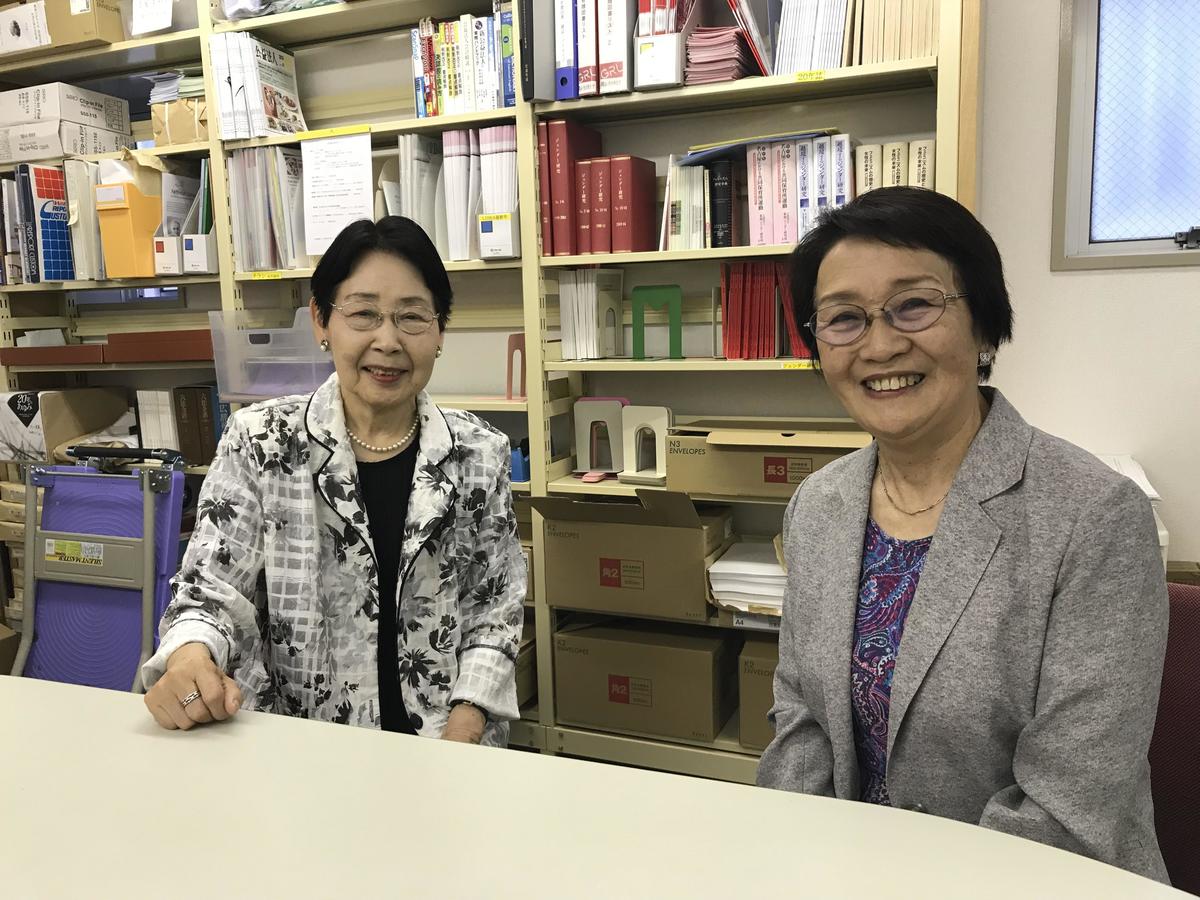June 13, 2018
The Regrets of a 99 Year Old Scholar
On the southern edge of Nagoya University's Higashiyama Campus, facing the Yamate Green Road, is a building surrounded by trees that doesn't look like part of the university. This is the Nagoya University Gender Research Library, which opened last November. As its name suggests, this library collects books relating to gender issues, and aims to be a hub for research and exchange. One of its main attractions is the Tamae Mizuta Library, a collection of around 7,000 books collected by Tamae Mizuta, Professor Emeritus of Nagoya Keizai University, a pioneer of women's studies. The collection was donated so that many people could use the books, but one of the users coming to the library recently is none other than Prof. Mizuta herself. She is currently working on a new book manuscript, and needs to refer to some of the books in the library.
 Nagoya University’s Gender Research Library has a bustling atmosphere, with a café on the ground floor
Nagoya University’s Gender Research Library has a bustling atmosphere, with a café on the ground floor
She was asked to write this manuscript by her husband, Hiroshi Mizuta, Professor Emeritus of Nagoya University. Hiroshi Mizuta is, of course, well known as a leading authority on British modern social thought, studying the ideas of thinkers like Adam Smith and Thomas Hobbes. As well as fostering many scholars, he has been actively involved in civic movements. He is also a member of the Japan Academy. When his book "Methods and Methodology in Social Research" (Kodansha's New Library of Knowledge) was due to be republished, he realized that "a history of modern thought that leaves out women is incomplete," and asked Tamae to write a part involving women. "If you are only looking at men, it is not a comprehensive study of social science. At over 90 years old, he seems to have finally realized that how problematic is the work he has done. I'm saying to him, 'it's a bit late, isn't it?'" laughs Tamae.
I am surprised to hear about this conversation. It is as if this great scholar, who will be 99 years old this autumn, is rejecting part of his own work, the results of many years' research. It must take a lot of courage. This attitude of continually questioning theory is also quite extraordinary.
The background is the current social situation regarding women. We cannot create a future society without properly considering women's issues. In Tamae Mizuta's words, there is a "crisis of our time." Both of them agree that social science has a great responsibility for this.
As they approach 100 and 90 years old respectively, keeping on going without losing interest, what issues will this rare couple of researchers pose to us now?
 Tamae Mizuta, Professor Emeritus of Nagoya Keizai University, in front of the books at the Tamae Mizuta Library
Tamae Mizuta, Professor Emeritus of Nagoya Keizai University, in front of the books at the Tamae Mizuta Library
After graduating from Tokyo University of Commerce (now Hitotsubashi University), Hiroshi studied there as a special research student. He met Tamae, who was studying English literature at the neighboring Tsuda Juku Senmon Gakko (now Tsuda University), when she came to attend a lecture at Hiroshi's university, and they got married soon after she graduated. Around this time, Hiroshi was made Assistant Professor at Nagoya University's Faculty of Law and Economics, which had just been founded the previous year, and Tamae enrolled in the Department of Law. This was in 1949. She went on to the Master's course at the graduate school, and apparently gained quite a reputation as "the Assistant Professor's wife who is a student of graduate school."
The couple's first joint work, "Socialism History of Thought" (Toyo Keizai Inc.) was published in 1958. In the same year, Hiroshi was promoted to Professor in the Faculty of Economics, which separated from the Faculty of Law and Economics, and Tamae completed her Master's course and became an assistant in the Faculty of Law. When the book was reprinted in 1971, they wrote in the afterword:
"This book, an experiment in co-authoring by a husband and wife, is memorable to the authors due to having been written in the poor living conditions of Japanese researchers and their families." "25 years have passed since universities opened to women, but the door to a career in research is still barred to women, and young researchers will always be faced with the same difficulties when they try to produce a new joint work like this." They conclude: "We hope that this book will be accepted also as a record of our fight against these difficulties."
These words communicate the determination and enthusiasm of the young couple taking on the challenge of producing a joint work, which was rare in those days, exactly sixty years ago.
Soon after, Tamae finished her term as assistant, and came up first against the barrier due to being a woman. The four male graduates, who graduated from the Department of Law and went on to the graduate school with her, all got jobs at the university, but Tamae was refused, with reasons like "it will be difficult if you have children." She continued teaching part time at junior colleges, and realizing that there was no point doing the same as men in her specialism of the history of thought, she changed her research theme and decided to study from a female perspective. Her first book "History of Thought on Women's Liberation" (Iwanami Shoten) was published in 1973, while she was teaching at Ichimura Gakuen College (now Nagoya Keizai University).
Hiroshi Mizuta's "Methods and Methodology in Social Research" was first published in 1975 and has been reprinted 20 times. Its predecessor "Encouragement of Social Science" was published in 1969, so it is actually half a century old.
Now this book will be reborn, as the paths of the two researchers converge to produce a joint work once again.
 Hiroshi Mizuta, Professor Emeritus of Nagoya University. Known for his huge collection of over 20,000 books tracing the quest for knowledge, 7,000 of which make up the Mizuta Library at Nagoya University Library. The collection includes originals of class
Hiroshi Mizuta, Professor Emeritus of Nagoya University. Known for his huge collection of over 20,000 books tracing the quest for knowledge, 7,000 of which make up the Mizuta Library at Nagoya University Library. The collection includes originals of class
"I wrote "The Formation of Modern Person ― A History of Modern Society" (University of Tokyo Press) in 1954, and since then, I have worked hard," says Hiroshi Mizuta. "However, there appeared an issue whether that modern person can be an independent individual. The existence of women has been ignored in the discussion ― even though the human race cannot reproduce without women." In the modern era, surpluses came about due to increased productivity brought about by the industrial revolution, but systems were established so that only men could benefit. It can be said that social science has been stuck in theory, without considering the actual issues of what happens when both men and women enter the system.
It is not that Hiroshi did not realize that this was odd at all. "Tamae was always scolding me about it, and I understood the problem. I'm always at an anti-establishment position, and I only wanted to show the intention to change," he says. He has been driven to a point where women's issues cannot be ignored any longer when "Methods and Methodology in Social Research" is reprinted now. "It's terrible that I have to take it at a time like this," he says with a wry smile.
"I think he does have an understanding of women's work, but it is idealism only, not put into practice," Tamae says harshly about her husband. When they were busy bringing up their child, Hiroshi was ahead of his time as a father, taking his child with him to university or to union meetings and collecting them from nursery school, but he left the running of the homemaking up to Tamae. "He might have good intentions, but he didn't know what to do. Now that we have been married so long, looking at everything that I do, he should have learned a bit more, I think," says Tamae. "Even if it's too late to put it into practice, he has at least to criticize his own work in the history of thought, I say."
According to Tamae, thinkers like Adam Smith and Thomas Hobbes talked about independent modern people, but they were single men, and they paid no attention to children or families. Jean-Jacques Rousseau wrote great things about education, but it was only education of men; he believed women should serve men. Considering how hard it is for women to be independent, their theories do not see the reality in a society.
Tamae talks about a "crisis of our time" because the model of a family supported by the husband's income has collapsed, and society is ageing while pensions are decreasing. In such an era, there is no male or female; everyone needs to be economically and psychologically independent. However, many women are not ready for this, and there must be a lot of men who feel uncertain too. What kind of society should we create to enable cooperation without losing independence? This is a major issue for social science.
One important point is that women cannot be independent as long as they are responsible for all the childrearing and caregiving, in other words, while women are considered as free labor. First, women must be seen as independent working people. In reality, men have a lack of awareness of this, and that leads to sexual harassment. In this sense, the recent sexual harassment case in the Ministry of Finance indicates a deep problem.
Hiroshi also believes that women's work in the home should not be free labor, and that society needs to take responsibility for work that has been left up to women. Furthermore, theoretically, mankind should pay for women's work including pregnancy and childbirth; in other words, society should bear responsibility. "What should we do, exactly? This is not a job for a 99-year-old."
 Emi Nishiyama (Representative Director) (right) and Masako Hioki (Executive Director) of the Tokai Foundation for Gender Studies, established in 1997. They have long dreamed of creating a women’s library as a research hub.
Emi Nishiyama (Representative Director) (right) and Masako Hioki (Executive Director) of the Tokai Foundation for Gender Studies, established in 1997. They have long dreamed of creating a women’s library as a research hub.
One of the objectives of the Gender Research Library is to "contribute to a paradigm change in 21st century knowledge by studying institutions and practices related to gender." The Tokai Foundation for Gender Studies and Meidai spent over three years in discussion before reaching agreement. Hiroshi Mizuta became an intermediary for discussions with the university, contributing towards the successful outcome, because one of the directors of the Foundation was a graduate of his seminars. He passed any queries on to his juniors.
"We want to create a network, including people from other countries, and make this a hub where people actually get together and discuss the issues, not just a collection of reference materials," says Emi Nishiyama, Representative Director of the Foundation. During the planning of the library, they visited women's libraries in other countries, and thought about what it should be like.
The library was constructed by donations and running costs for the next 20 years are covered by the Foundation. It is Japan's only women's library, and people sometimes ask her why it is located at Meidai. She hopes that it will be a success, so that it will be said "it could only have been established at Meidai."
Meanwhile, Tamae and Hiroshi Mizuta are working on their first joint work in 60 years. What will they write, how will they write it, and what will be added? It is an unprecedented attempt, and they both seem to be struggling with it. I look forward to the results with great anticipation.

 Subscribe to RSS
Subscribe to RSS